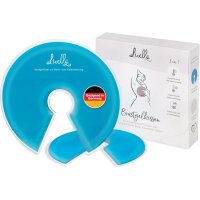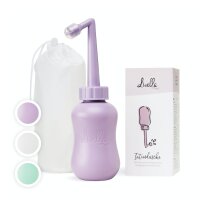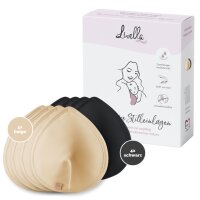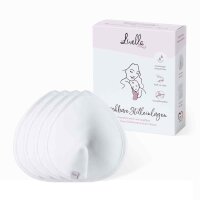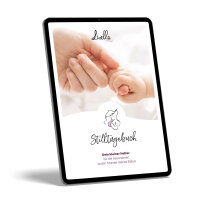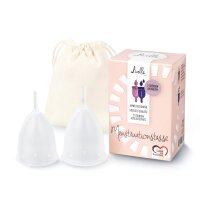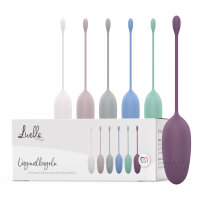Fidgeting, crying and angry pushing away from the breast. It is not uncommon for babies to go through phases during which they simply don’t want to hold still during breastfeeding. For new mothers, these phases are particularly stressful. Many then start to worry: “Why does my baby pull away and cry while breastfeeding?”
There can be many different reasons why a baby is crying while breastfeeding. This means that there are also many different ways you can try to get your baby to breastfeed again. Read on to find out what might be the cause of your baby’s restlessness and get some hands-on tips on what to do when your baby cries at the breast. Plus, you will learn how to better understand your baby’s signals and needs.
Table of contents
Why does my baby pull away and cry while breastfeeding?
Baby crying while breastfeeding: other possible causes
Baby crying while breastfeeding: these tips can help
Baby crying while breastfeeding: better understanding the needs of your newborn
Conclusion: Why does my baby pull away and cry while breastfeeding?
Why does my baby pull away and cry while breastfeeding?
It is not unusual for babies to be restless and fidgety when breastfeeding. Nevertheless, new mothers are often worried that they might be doing something wrong and thereby cause restlessness in their child.
Bad breastfeeding management can, indeed, be the reason behind an unhappy breastfed baby, but there are many more possible causes to take into consideration, including:
- Hunger: Everyday life with a baby is usually quite busy, which means that it’s not always possible to put your little one to the breast at the first signs of hunger. For instance, if you are out and about, your baby might already be very hungry by the time you finally manage to find a suitable place to breastfeed in public. Hungry babies are usually very impatient and fidgety when feeding.
- Sleepiness or lack of hunger: On the other hand, your baby might also be crying due to lack of hunger. If babies are not hungry enough, feeding is usually difficult and associated with breast refusal because they are simply not ready to feed yet. Also, if your baby has just woken up, breastfeeding often doesn’t go as smoothly as usual.
- Uncomfortable breastfeeding position: Not every breastfeeding position that you find comfortable as a mum is also comfortable for your baby. Try out different breastfeeding holds to see if there are any preferences on your baby's side. For every position, check that you hold your baby close to your chest and that it’s easy for him or her to latch on.
- Fixed breastfeeding schedule: Establishing a breastfeeding schedule might work well for you as a mum, but doesn’t necessarily correspond to your baby’s needs. Experts therefore recommend breastfeeding on demand. This means that you breastfeed based on your baby's individual needs, rather than following a fixed schedule.
- Distractions while breastfeeding: For babies, everything that happens around them is incredibly exciting. In environments where many things happen at the same time, they can quickly experience a sensory overload that distracts them from feeding. This often results in restlessness, but can also lead to fidgeting, crying and frustration because they would rather focus on what is happening around them than breastfeeding.
- Nursing strike: Even if you are doing everything right when breastfeeding, there might still be a phase in your baby’s first months of life during which he or she is visibly unhappy at the breast. This phase is often referred to as nursing strike and often occurs between the 3rd and 4th month after birth. If your baby is crying while breastfeeding and starts fidgeting and pushing away from the breast, he or she might have gone on a nursing strike.
- Your own tension: The more a baby cries and fidgets at the breast, the more tense and nervous the mother usually becomes. After a while, your tension will already start building up before the feeding session. Your baby, in turn, will sense that you are tense and reflect it by fidgeting and screaming.
- Alcohol or medication while breastfeeding: If you drink alcohol while breastfeeding and don't wait long enough before breastfeeding again, the traces of alcohol passing through your breast milk to your baby might lead to restlessness. The same goes for different types of medication. That’s why it is particularly important to check that any medication you take is safe for breastfeeding.
- Baby swallowing air while crying: If your baby is having a bad day and cries a lot, the air that is swallowed while crying can cause discomfort. This, in turn, can lead to restlessness when breastfeeding.
- Full nappy: Another reason why your baby is crying while breastfeeding might be a full nappy. A full nappy makes babies feel very uncomfortable which they typically react to with restlessness and screaming. Breastfeeding then is the last thing your baby wants to focus on.
- Physical discomfort: Physical discomfort or pain can also be a reason why your baby is crying while breastfeeding. It might just be a blocked nose that makes it difficult for your little one to breathe, but it could also be something more severe, such as a thrush infection that is affecting your baby’s mouth, a painful middle-ear infection or an allergy triggered by your breastfeeding diet.

Baby crying while breastfeeding: other possible causes
Why does my baby pull away and cry while breastfeeding? This question keeps many mothers up at night. Restlessness, fidgeting and crying during breastfeeding is often linked to other breastfeeding problems, including:
- Nipple confusion: Nipple confusion is when breastfed babies adopt a different sucking pattern that is not suitable for breastfeeding after having been bottle-fed for a while. The use of artificial teats, such as those found on baby bottles and pacifiers, often leads to nipple confusion which ultimately leads to frustration because the baby is unable to drink properly from the breast.
- Low milk supply: Low milk supply can lead to various other breastfeeding problems, including restlessness and crying during breastfeeding. A low supply of breast milk means that your little one needs to suck very hard because the milk flow is slow. After a while, your baby might become frustrated with this and start resenting the breast, hence the fidgeting and crying.
- Strong let-down and too much breast milk: Breast milk oversupply can also cause your baby to go on a nursing strike. If your breast is overly full, it is very difficult for your baby to grasp it and latch on properly. In combination with an overactive let-down reflex, this can easily become too much for your baby to handle. A strong milk flow is often the reason why babies keep letting go of the breast before becoming restless and eventually starting to cry.
Baby crying while breastfeeding: these tips can help
There are many different ways to soothe a baby who is crying while breastfeeding. What will work in the end typically depends on the root cause of your baby’s behaviour. Here are a few tips you can try out straight away:
- Allow for skin-to-skin contact: Direct skin-to-skin contact not only activates your baby's natural breastfeeding reflexes, but can also help soothe your restless, unhappy baby. Especially during periods of illness, close physical contact with you can give your little one a feeling of security and protection.
- Calm down and relax: Relaxation and calmness are two important aspects when it comes to preparing for breastfeeding. If you are calm and relaxed, your baby is likely to reflect this and calm down too.
- Check your breastfeeding latch and positioning: A good breastfeeding latch can prevent a range of different breastfeeding problems such as sore nipples, blocked milk ducts or mastitis. Verifying your breastfeeding position can also help prevent your newborn from becoming restless because it gives you a chance to check that your baby is positioned comfortably.
- Create a suitable breastfeeding environment: If your baby is crying while breastfeeding because he or she is distracted by what is going on in the immediate surroundings, the easiest way to get him or her to calm down is to eliminate possible distractions. For instance, you can darken the room and close the door to get rid of distracting noises.
- Get support from your partner and friends: Being a breastfeeding mum doesn’t mean that you have to do everything on your own. If you are struggling because your baby is crying while breastfeeding, ask your partner or friends for help. They might be able to calm your little one down enough to get him or her to breastfeed.
Regardless of what causes your baby’s restlessness and crying, it’s important to be patient and understanding. Since babies are unable to communicate their needs with words, they have to find other ways of expressing themselves. Understanding your baby's individual cues and needs might be difficult in the beginning, but you will get there eventually.

Baby crying while breastfeeding: better understanding the needs of your newborn
If your baby is crying while breastfeeding, it’s not to make life difficult for you. Restlessness, fidgeting and crying are signals through which your baby is trying to communicate. The trick is to read and interpret these signals correctly. Here are a few tips that will help you succeed:
- Hunger cues: Restlessness, whining and crying are often signs that your baby is hungry. To verify if it really is hunger that makes your baby restless and unhappy, you can place your finger in front of your baby’s mouth. If your little one starts sucking directly, you can be sure that hunger is the reason for the crying.
- Signs of an overstimulated baby: Tensing up, shrill crying and arching of the back are possible signs of an overstimulated baby. If overstimulation is causing your baby to cry and fidget, you should take your little one to a quiet room where there are no stimuli.
- Signs of a lack of attention: Babies need a lot of attention. If they don’t get the amount of attention they want and need, it’s not uncommon for them to start whining. If the crying stops as soon as you make eye contact, you can be sure that it was just about getting your attention.
Conclusion: Why does my baby pull away and cry while breastfeeding?
There can be many different reasons why your baby is crying while breastfeeding. Possible causes might be that your baby is having a bad day or that he or she has gone on a nursing strike. External factors such as overstimulation can also cause your baby to be restless and fidgety and prevent proper breastfeeding.
In this situation, calmness, patience and empathy are usually what is needed to calm your baby down. If you let the crying and fidgeting make you nervous, your baby will sense this and will probably react by crying louder. So try to stay calm and relaxed despite the stressful circumstances.
You can also try to create a calm, low-stimulation environment for breastfeeding and establish skin-to-skin contact to activate your baby's natural reflexes. In any case, it helps to study your baby's cues and signals closely and learn how to interpret them correctly. Once you master this art, you will know how to calm your little one down.


